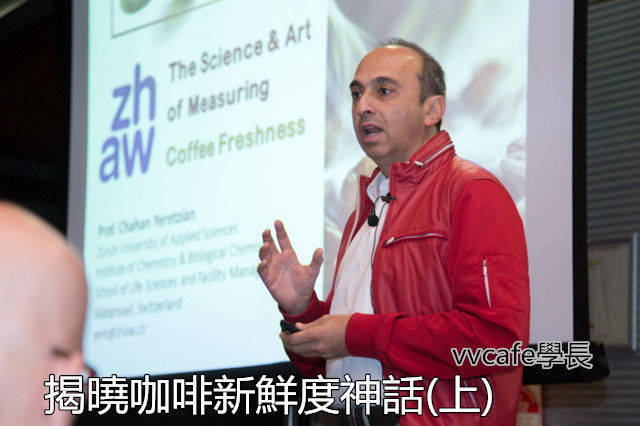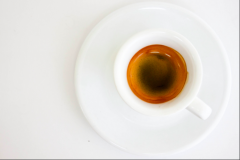Revealing the Myth of Coffee freshness (part I)

For professional baristas, please follow the coffee workshop (Wechat official account cafe_style)
This article is translated from the sprudge.com website, there are a lot of news and interviews about coffee, but all in English, be more patient when reading.
The full text will be translated by senior vvcafe. Please remind me if you have any mistakes.
Reveal the myth of coffee freshness
Who is the interviewer: professor Cn Yeretzian.
Professor Yeretzian is currently the head of the Center for Analysis and physical Chemistry at the University of Zurich and a board member of the European Fine Coffee Association.
His background is not translated one by one. In short, he studies food in the industry and universities. In 2008, he set up a coffee research center at the University of Zurich. 70% of the research is coffee, and he also has a master's degree in coffee. He is committed to making coffee professional and scientific. Among them, a considerable amount of research time has been spent on the freshness of coffee.
The following starting points
Q1: why are there so many misunderstandings about the freshness of coffee? What is the biggest myth?
Coffee freshness seems to have become a religious belief, everyone has their own requirements for freshness, even if you grind the coffee and leave it for 2 minutes, someone will say, 'that's not fresh, you should make it right away'. It's like a religious ritual.
But this is actually a personal subjective consciousness of freshness, often based on the five senses of the experts, no one can really say why, because no one can know the measure of freshness.
So most of the myths about freshness are subjective and not really divine. In order to make the product better, it is not to advocate the myth, but to be able to measure the freshness.
I think the definition of freshness should be returned to the public to understand what the value of freshness is. Maybe there are moments when absolute freshness is not really necessary, such as in cold bubbles or cold drinks. When coffee is stored in bottles and on shelves for days or even a week, are they still fresh products? These questions are difficult and subjective, but I hope to tell you how to measure freshness and get rid of the myth of freshness. Something 'not fresh' might be better, can you believe it? It's not a myth.
Q2: when the coffee is too fresh
There are two ways to simply measure the freshness of coffee. The first is measured by aroma, which is one of the most important elements of fine coffee. If you take the aroma as the yardstick, you will find that the aroma will disappear in a few days, or even just one day. So if all you think about is aroma, it can be said that coffee is not fresh in a day.
But there is another measure: through carbon dioxide. Because the aroma and carbon dioxide are produced with baking, it starts ticking like a clock immediately after baking. From the point of view of carbon dioxide, the fresh problem will be more complicated, because in the cooking process, if there is too much gas will affect the result of extraction.
Try to imagine that in the first week of baking, your coffee is like a living organism. The exhaust is very intense and continues to develop. During this period, if you think about it from the perspective of aroma, the freshness is decreasing, but from the perspective of carbon dioxide, you can't say that the freshness has decreased, you can only say that coffee is constantly changing.
So, for me, the flavor is changing in the first week, and I don't think it's not new. After all, it's a developing organism. A week later, the coffee began to stabilize because it had discharged 60% of the carbon dioxide. So after a week, you can start to study the changes in freshness, especially in terms of aroma.
The first week has changed dramatically! The problem is, in order to master the first week of coffee, you have to adjust your machine and bean grinder every day.
So as long as the first week is normal, there is no problem of freshness, just the change of coffee beans, not the loss of coffee beans.
Important Notice :
前街咖啡 FrontStreet Coffee has moved to new addredd:
FrontStreet Coffee Address: 315,Donghua East Road,GuangZhou
Tel:020 38364473
- Prev

Hanging earbags can also be colorful (5): Sicilian Coffee (part two)
Professional barista communication please follow the coffee workshop (Wechat official account cafe_style) then add ice in the snow cup, there are large ice cubes, if there are only small ice cubes, then put two more cubes, otherwise it will dissolve too much ice water, the taste will be lighter and two tablespoons of sugar, if there are no teaspoons, usually one tablespoon of western food soup can be used. Because of West West.
- Next

Revealing the Myth of Coffee freshness (part two)
Exchange of professional baristas Please follow the coffee workshop (Wechat official account cafe_style) Q3: some experts in the United States say: coffee should be kept in the freezer, is that right? When the temperature drops, the aging of coffee beans slows down. Changes in all ingredients, especially those related to aroma, will slow down 10 times. If your coffee is 10 degrees below room temperature, the aging rate will slow down twice as fast.
Related
- Beginners will see the "Coffee pull flower" guide!
- What is the difference between ice blog purified milk and ordinary milk coffee?
- Why is the Philippines the largest producer of crops in Liberia?
- For coffee extraction, should the fine powder be retained?
- How does extracted espresso fill pressed powder? How much strength does it take to press the powder?
- How to make jasmine cold extract coffee? Is the jasmine + latte good?
- Will this little toy really make the coffee taste better? How does Lily Drip affect coffee extraction?
- Will the action of slapping the filter cup also affect coffee extraction?
- What's the difference between powder-to-water ratio and powder-to-liquid ratio?
- What is the Ethiopian local species? What does it have to do with Heirloom native species?

